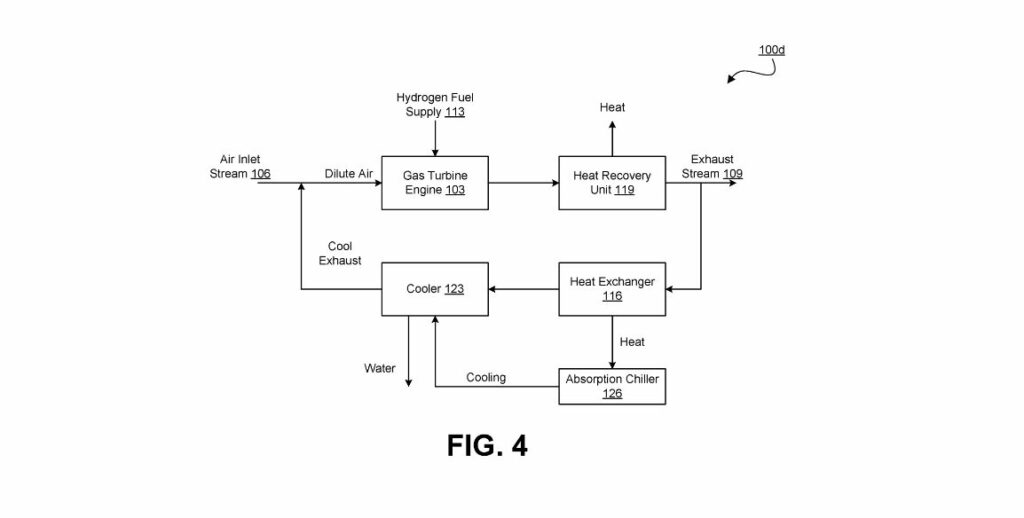A recent patent filed by the University of Florida Research Foundation outlines advanced systems for gas turbine engines that utilize hydrogen as fuel. The patented technology enhances gas turbine engines’ efficiency and environmental performance, which are crucial for various industrial applications.
Features and Improvements
The patented system integrates several unique components into traditional gas turbine engines:
1. Hydrogen Fuel Supply: The system uses hydrogen, a cleaner alternative to conventional fossil fuels, to power the gas turbine engine.
2. Heat Exchanger: This component cools the gas turbine’s exhaust stream. Cooling the exhaust can potentially improve the engine’s overall efficiency and lifespan.
3. Recirculation Pathway: The innovative part of the system is the pathway that mixes the cooled exhaust stream back with the incoming air inlet stream. This recirculation process optimizes the combustion process within the turbine, enhancing fuel efficiency and reducing emissions.
Potential Applications
The improved gas turbine engine systems can have broad applications in various industries, including:
– Power Generation: Utilities can adopt this technology to produce electricity with reduced environmental impact. Hydrogen as a fuel source offers a clean energy alternative with fewer pollutants.
– Aerospace: This technology can be applied to aircraft engines, providing a potential roadmap for more environmentally friendly aviation.
– Industrial Processing: Industries that rely heavily on gas turbines for mechanical drives, such as refineries and chemical plants, can also implement these advanced systems.
The introduction of such advanced gas turbine systems could have significant implications for the hydrogen economy and the broader energy market:
– Environmental Benefits: This technology aligns with global efforts to combat climate change by reducing emissions and enhancing fuel efficiency.
– Economic Advantages: Improved efficiency and reduced maintenance costs might lower operational expenditures for industries using gas turbine engines.
– Market Adoption: As hydrogen fuel becomes more accessible, industries might shift towards such innovative systems, fostering growth in the hydrogen market.
Compared to existing gas turbine systems that use conventional fossil fuels, this patented technology offers several advantages:
– Cleaner Emissions: Hydrogen significantly reduces harmful pollutants compared to natural gas or diesel fuels.
– Enhanced Efficiency: Integrating a heat exchanger and recirculation pathway translates to better fuel utilization and lower operational costs.
– Longevity: Cooling the exhaust stream helps minimize wear and tear, potentially extending the turbine’s life.
Key technical elements from the patent include:
– Hydrogen Fuel Supply System: This system ensures a steady and controlled hydrogen supply to the turbine.
– Heat Exchanger Design: The exchanger is designed to cool the exhaust stream effectively.
– Recirculation Pathway Mechanism: Detailed configurations of the pathway that recirculate the cooled exhaust for optimal mixing with the air inlet stream.
The University of Florida Research Foundation’s patent on improved gas turbine engine systems represents a meaningful advancement in the energy sector. The patent offers a cleaner, more efficient, and potentially more cost-effective solution by utilizing hydrogen fuel, incorporating a heat exchanger, and adding a recirculation pathway. As hydrogen technology continues to evolve, innovations like this could drive significant environmental and economic benefits, solidifying hydrogen’s role in the future energy landscape.
